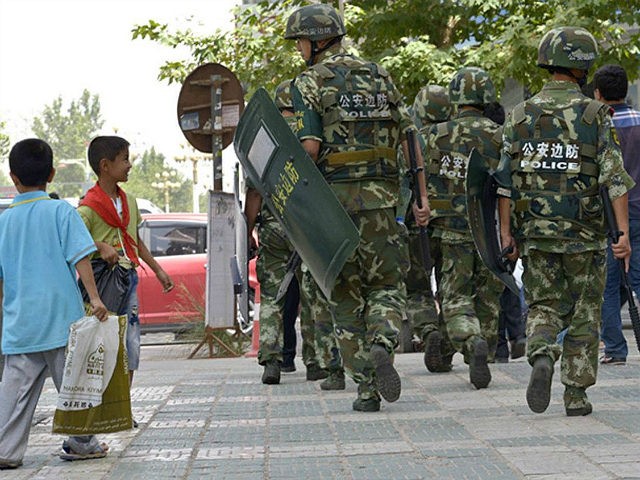The government of China’s Muslim-populated western region of Xinjiang has announced it is implementing new measures to keep its border with Pakistan as sealed as possible to prevent jihadist sympathizers from crossing into what many experts believe to be the world’s premier terrorist training destination.
“We need to make sure not a single terrorist can get in or out of Xinjiang illegally, especially when our neighboring countries are facing rising terrorist threats,” Xinjiang Communist Party official Aniwar Turson said of the new measures, according to the state-run China Daily. While government representatives did not specify exactly how strengthening border security would work, one official suggested that “strict inspections near the borders” would be part of the plan. Xinijang also borders Afghanistan, currently embroiled in its own war against radical Islamic groups.
The Times of India also quotes Xinjiang Communist Party chairman Shohrat Zakir as stating that the government would improve “efforts in entry-exit system to curb illegal movement of people across the border.”
The move follows an incident earlier this month in which police killed three men who attempted to attack a Communist Party office armed with knives and a bomb. Two others were killed in the attack. The South China Morning Post reports that the men involved were known to law enforcement and “suspected of carrying out an attack two years ago in Pishan county in Hotan prefecture.” While the men are believed to be ethnic Uighur separatists, the Chinese government has not identified them as such.
Indian outlets are reporting the border control news as potential evidence of tension between China and its ally (and Indian rival) Pakistan. The Times of India called the announcement a move on China’s part to “signal its displeasure about the Pakistan military’s ability to stop militants from sneaking into” Xinjiang. India.com reported that the move would seal the Chinese-Pakistani border. The Indian outlet Top Yaps bluntly referred to the announcement as a “slap in the face” to Pakistan.
China has provided Pakistan financial assistance for years and has reportedly sold Pakistan more weapons than any other country.
China has long struggled to keep Xinjiang at peace, given the prevalence of ethnic Uighurs in the country and movements within Xinjiang to separate from the Communist Party, governing from the other side of the country in Beijing. The Uighurs are a Turkic ethnic minority with their own language and are predominantly Muslims, their religion putting them at odds with the state worship inherent in communism. Xinjiang is home to terrorist groups such as the East Turkestan Islamic Movement (ETIM), which seeks to use violence to establish an independent, Muslim state in Xinjiang.
Reports indicate that individuals who may have been swayed by ETIM in the past, however, are increasingly joining groups like the Islamic State, the Taliban, and al-Qaeda. The Chinese government has claimed that hundreds of Xinjiang Uighur residents have left the region to fight for ISIS.
In response to these reports, the Chinese government has implemented multiple measures to discourage the public practice of Islam in Xinjiang. Communist Party members are not allowed to fast in public during the Ramadan holiday, and all citizens are banned from wearing burqas generally and any sort of Islamic garb on public transportation. Shops must sell alcohol and cigarettes, haram items, or face legal consequences. The Chinese government has also openly promoted interethnic marriage as a means to dilute the influence of Islam in the region.

COMMENTS
Please let us know if you're having issues with commenting.